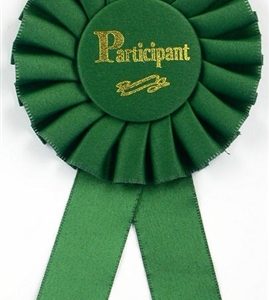You might remember the participation ribbon you received in second grade for participating in track and field day, or the one you received in fourth grade for participating in the spelling bee. You didn’t think anything of it and might have thrown it away, simple as that. Little did you know that one day your participation ribbon would become a news story about the entitlement of a generation.
If you type participation ribbons into Google and get past the first page of ads, you’ll see articles with the titles “Participation Ribbons Send a Dangerous Message” and “The Problem With Participation Ribbons.”
How can such a small piece of ribbon cause any problems?
The general consensus around campus is, they don’t.
When asked, people had a hard time remembering when or where they received their participation ribbons and did not recall any true sense of excitement or pride in receiving them.
“I did receive a trophy for my softball team participating in a tournament. I never set it out with my others, as it didn’t mean as much to me, and quite honestly, I was a little embarrassed when someone made a big deal about it and I only got it because I showed up,” education professor Diane Shanafelt stated.
If nobody cares about receiving them, then why all of the backlash? One student, Kelsey Diggins, joked and said it’s because everybody needs something to complain about. The answer is slightly deeper.
The concern from older generations about participation ribbons is partially due to the fact that each generation is entitled in their own way. Psychologist Jessica Pleuss explained that older generations feel entitled to working at the same job until retirement or receiving pensions, while younger generations are more motivated by material goods.
Does this make one generation more entitled than the other? No. It means each generation places their values in life differently.
Even so, has there been a general trend of kids becoming brattier and/or unrulier overall?
Shanafelt says no. She worked with kids for 34 years as an elementary educator in the Sioux City Community School District and still does not believe she’s seen a general trend towards kids becoming more entitled overall.
So what’s the point of participation ribbons anyway?
Participation ribbons are meant to encourage kids to actively participate in activities where they can grow and get better. This gives kids the chance to be fully immersed in an activity and enjoy it before losing has to enter the picture.
Not to say that losing is a bad thing, it helps kids grow and understand where they need to improve in order to succeed. But rewarding young kids for learning a new skill and trying their best is a good starting relationship for further learning.
“If participation ribbons at a young age can help keep a kid interested enough in a sport or game until they are old enough to understand the lessons of losing, then I think they can be a great thing,” English professor David Elder said.
Madison Pierson, a senior, elaborated on her thoughts. “I think participation ribbons are more for the sake of going, ‘Yay, congratulations you completed a thing’ and instilling the ideas of seeing a project through to the end, rather than feeding kids feelings of self entitlement.”
As she further explained, “Getting a participation ribbons in my track and field events in third through sixth grade did not make me feel entitled to varsity on my track team.”
If older generations still believe that giving out participation ribbons instills entitlement and harms children, then why are they still being given out? Tom Maxon, a former youth coach, believes the problem is with the parents.
Maxon believes kids are happy just to play and be involved. It’s the parents that are concerned with whether or not their kid is going to be devastated if they don’t get a trophy. He believes if it weren’t for the parents, kids would be content either way.
“A lot of parents say that they don’t want every kid to get a trophy, but who is giving the trophies to them? The generation that thinks the kids are entitled,” Elder said.
Jessica Pleuss: pleussj@morningside.edu
Diane Shanafelt: shanafeltr@morningside.edu
Kelsey Diggins: kad011@morningside.edu
Madison Pierson: mnp002@morningside.edu
David Elder: elderd@morningside.edu
Tom Maxon: maxon@morningside.edu

Speak Your Mind